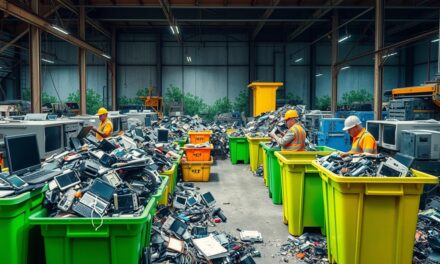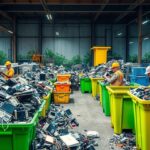Did you know that household cleaning products contribute to over 25 billion pounds of plastic waste annually? This is a huge problem that shows we need better cleaning solutions. Solutions that protect our homes and the planet.
I’m passionate about living eco-friendly, and I’ve found zero-waste cleaning is key. Our old cleaning ways are not only bad for the planet but also for our health. Traditional cleaners are full of harmful chemicals and plastics that hurt our environment.
Zero-waste cleaning is a game-changer for a clean home. Using simple things like white vinegar, baking soda, and essential oils, we can make effective cleaners. These cleaners are safe, work well, and don’t harm the environment. They also keep our families safe from harmful chemicals.
In this guide, I’ll share all about eco-friendly cleaners. You’ll learn to make your own natural cleaners, cut down on plastic, save money, and make your home healthier. Get ready to change your cleaning habits for the better.
Understanding the Impact of Conventional Cleaning Products
Exploring plastic-free cleaning solutions opened my eyes to hidden dangers in our cleaning products. Traditional cleaners are more than just surface issues. They affect our health and the planet.
- Releasing volatile organic compounds (VOCs) that contribute to indoor air pollution.
- Generating extensive non-biodegradable plastic packaging.
- Introducing harmful chemicals into our living environments.
Environmental Concerns of Traditional Cleaners
Most cleaning products release VOCs that harm our air. About 80% of their packaging is non-biodegradable plastic. These plastic-free cleaning solutions are key to reducing our ecological footprint.
Health Risks Associated with Chemical Cleaners
Research on non-toxic cleaning methods shows serious health risks. Chemicals like ammonia and chlorine bleach can cause breathing problems, skin irritation, and organ damage. Quaternary ammonium compounds are linked to asthma and other health issues. The plastic packaging problem,
Every piece of plastic ever created is somewhere on our planet.
Choosing sustainable cleaning alternatives can cut down household waste by about 1,000 pounds a year. By going for plastic-free cleaning, we protect our environment and ensure a healthier future for our planet.
Essential Zero-Waste Cleaning Ingredients
Changing your cleaning routine is easy with natural ingredients. I’ll show you simple ways to make your home cleaner without harming the environment.
Zero-Waste Cleaning Ingredients
Green cleaning starts with a few key ingredients. These are powerful and good for the planet.
Let’s look at the must-haves that can replace many chemical cleaners:
- Baking Soda: A multipurpose powerhouse that removes odors and tackles tough stains.
- White Vinegar: Cuts through grease and disinfects multiple surfaces.
- Castile Soap: A versatile cleaner for various household needs.
- Essential Oils: Natural disinfectants with pleasant aromas.
All experts say,
Natural ingredients are not just effective – they’re a game-changer for sustainable home cleaning.
These ingredients can tackle most cleaning tasks. Baking soda is great for scrubbing, and white vinegar loosens dirt. For tough spots, mix baking soda and water for a strong paste.
Ingredient and primary use chart:
| Ingredient | Primary Use |
| Lemon Juice | Cuts grease, natural disinfectant. |
| Hydrogen Peroxide | Bleach alternative, stain remover. |
| Salt | Abrasive cleaner, rust removal. |
Using these ingredients makes cleaning safer and reduces waste. Green cleaning is simple, works well, and is good for your home and the planet.
Zero-Waste Cleaning Tools and Equipment
Starting a zero-waste cleaning routine is easy with the right tools. I found that simple changes can cut down on waste and keep cleaning efficient.
Zero-Waste Cleaning Tools
Building a sustainable cleaning kit means choosing durable, eco-friendly items. Natural materials work well and don’t harm the environment.
Plastic-Free Cleaning Tools
- Bamboo scrub brushes with natural bristles.
- Wooden dish brushes with replaceable heads.
- Coconut fiber cleaning pads.
- Natural Mayan Loofah Sponge Scrubbers.
These tools cut down on plastic waste and clean well. Natural Mayan Loofah Sponge Scrubbers compost in 30 days, making them a great choice.
Reusable Cleaning Cloths and Materials
- Cotton microfiber cloths.
- Organic cotton cleaning rags.
- Reusable paper towel alternatives.
- Swedish dishcloths.
An expert says,
By choosing reusable cleaning tools, you’re not just cleaning your home—you’re protecting our planet.
Storage Solutions for DIY Cleaners
Use smart storage with glass spray bottles and mason jars. Brands like ESNTL LVG offer reusable glass bottles that help reduce plastic waste.
For storage tips, label containers well, use airtight seals, and keep cleaning supplies in one place.
All-Purpose Natural Cleaning Solutions
Making your own natural cleaners is simpler than you think. I’ve found that making sustainable household products is easy and works well for daily cleaning.
DIY Natural Cleaners For Sustainable Household Products
My favorite all-purpose cleaner recipe is a big help for keeping your home clean.
Here’s a mix that handles most messes:
- 1 1/2 cups warm water.
- 1/2 cup white vinegar.
- 15 drops essential oils.
A user says,
Clean homes don’t require harsh chemicals – just smart, natural solutions.
This cleaner is great because it can do many things. White vinegar is a natural disinfectant, and essential oils add antibacterial properties and a nice smell. You can choose from different essential oils like tea tree, lavender, or lemon to change up the scent.
Ingredient, purpose and benefit chart:
| Ingredient | Purpose | Benefit |
| White Vinegar | Base Cleaner | Natural Disinfectant. |
| Essential Oils | Fragrance and Antibacterial | Kills Germs Naturally. |
| Warm Water | Dilution | Enhances Cleaning Power. |
Remember, your natural cleaners work best on sealed surfaces. Always test a small area first to make sure they won’t damage different materials.
Pro Tip: Keep your cleaner in a glass spray bottle. This makes your sustainable products plastic-free and better for the environment!
Specialized Room-by-Room Zero-Waste Cleaners
Creating eco-friendly cleaners for different spaces in your home helps reduce environmental impact. It also keeps your home sparkling clean. I’ll show you how to make non-toxic cleaning methods for each room’s unique needs.
Zero-Waste Cleaning Solutions For Different Rooms
Kitchen Cleaning Solutions
In the kitchen, natural cleaning methods are key. They tackle grease and bacteria without harsh chemicals. My top picks for kitchen cleaners are powerful yet gentle.
- Degreasing Solution: Mix white vinegar, water, and lemon essential oil.
- Natural Disinfectant: Combine hydrogen peroxide with tea tree oil.
- Cutting Board Cleaner: Sprinkle salt, then scrub with half a lemon.
Bathroom Natural Cleaners
Bathrooms need strong cleaning. Experts say clean them once a week to fight dust, mold, and bacteria. I’ve found non-toxic ways to keep your bathroom clean and safe.
- Toilet Cleaner: One cup vinegar, ½ cup baking soda, essential oils.
- Soap Scum Remover: White vinegar and warm water.
- Grout Cleaner: Mix three parts baking soda to one part hot water.
Green cleaning advocate,
Clean doesn’t have to mean toxic – nature provides powerful cleaning agents.
Living Space Maintenance
Maintaining living spaces needs gentle yet effective methods. Eco-friendly cleaning can cut down chemical use by about 30%. My tips aim to reduce waste and keep your home smelling fresh.
- Dust-Busting Solution: Olive oil and white vinegar mixture.
- Air Freshener: Essential oil and water spray.
- Surface Cleaner: Castile soap with warm water.
Using these zero waste cleaners makes your home healthier. It also greatly reduces your environmental impact.
Deep Cleaning with Zero-Waste Methods
Dealing with tough cleaning tasks doesn’t need harsh chemicals. Green cleaning alternatives can change your deep cleaning routine. They also help reduce waste, protecting your home and the environment.
Zero-Waste Deep Cleaning Techniques
I’ve found effective zero waste methods for tackling stubborn grime. These methods don’t use toxic commercial products. The secret is using natural ingredients to clean tough tasks. Environmental sustainability expert,
Zero-waste cleaning is about working smarter, not harder.
Essential Zero-Waste Deep Cleaning Strategies
- Create powerful baking soda scrub pastes for tough surfaces.
- Use vinegar solutions for descaling and disinfecting.
- Implement natural enzymatic cleaners for odor elimination.
- Leverage microfiber cloths for streak-free cleaning.
Research shows microfiber cloths can last up to 500 washes. This is a big waste reduction compared to disposable cleaning materials. One reusable mop head can replace 60-100 disposable wet floor wipes.
Cleaning challenge, zero-waste solution and waste reduction impact chart:
| Cleaning Challenge | Zero-Waste Solution | Waste Reduction Impact |
| Tough Stains | Baking Soda Paste | Eliminates need for 2-3 chemical cleaners. |
| Limescale Buildup | White Vinegar Solution | Reduces plastic bottle waste. |
| Odor Removal | Essential Oil Treatments | Avoids chemical air fresheners. |
Using these zero waste cleaning methods makes your home sparkle. It also helps protect the environment. The United States Geological Survey found 69% of streams have detergent traces. So, our sustainable choices are more important than ever.
Sustainable Storage and Organization
It’s important to have an organized storage system for your plastic-free cleaning solutions. This keeps your home tidy and ensures your homemade cleaners work well and safely.
Zero-Waste Glass Storage Containers
Glass Container Solutions
I suggest using glass containers for your DIY cleaning solutions. Glass jars and bottles are infinitely recyclable and safe for the environment. They are also non-toxic, making them great for eco-friendly cleaning storage.
Here are some benefits:
- Prevents chemical leaching.
- Easy to clean and reuse.
- Allows you to see the contents clearly.
- Supports a zero waste lifestyle.
Labeling and Safety Practices
Clear labeling is key for an organized cleaning system. I recommend making durable, water-resistant labels.
They should include:
- Product name.
- Ingredients.
- Date of preparation.
- Usage instructions.
Experts say,
Organization is the key to a clean and sustainable home environment.
Zero-Waste Storage Tips
Going minimalist in cleaning is more than just storing solutions.
Here are some zero waste storage tips:
- Repurpose food jars for cleaning solution storage.
- Create a compact cleaning caddy.
- Use Lazy Susans to maximize accessibility.
- Store cleaning tools in reusable cloth bags.
By using these sustainable storage tips, you’ll cut down on waste. You’ll also have a more efficient and organized cleaning system. This supports both the environment and your well-being.
Cost-Effective Benefits of Zero-Waste Cleaning
Choosing sustainable household products is not just good for the planet. It’s also a smart move for your wallet. I found out that zero waste cleaning can save you a lot of money.
Zero-Waste Cleaning Cost Savings
Waste reduction techniques can save you a lot of money. Making your own cleaners can cut down your household expenses a lot.
Here’s how:
- Homemade cleaning solutions cost up to 80% less than commercial products.
- Reusable cleaning tools eliminate recurring purchase costs.
- Reduced plastic packaging saves money and reduces environmental waste.
Think about the bigger picture of sustainable practices. The recycling industry is huge, making $117 billion a year. It also creates 681,000 jobs across the country.
Sustainable cleaning is not an expense—it’s an investment in both your home and the planet.
Cleaning approach, annual cost and environmental impact chart:
| Cleaning Approach | Annual Cost | Environmental Impact |
| Commercial Cleaners | $300-$500 | High Plastic Waste. |
| Zero Waste DIY | $50-$100 | Minimal Environmental Footprint. |
By choosing zero waste cleaning, you’re not just saving money. You’re also helping the economy grow. The green sector could create 1.1 million new jobs if we recycle more.
Seasonal Cleaning and Maintenance Tips
Spring cleaning is more than a tradition. It’s a chance to clean your home and help the environment. Almost 90% of people do it, making it a great time to use eco-friendly cleaners.
Seasonal Zero-Waste Cleaning Strategies
When cleaning season comes, I focus on getting rid of clutter and cleaning smart. It’s interesting to know that households throw away 30% more during spring cleaning. About 70% of people also admit to having things they don’t use.
Cleaning is not about perfection, but about making consistent, mindful choices that reduce waste and create a healthier living environment.
- Spring Cleaning Strategy:
- Donate unused items to local charities.
- Recycle electronics and appliances responsibly.
- Replace disposable cleaning tools with reusable alternatives.
- Fall Preparation:
- Deep clean HVAC systems.
- Check and replace air filters.
- Organize storage spaces.
Using a zero waste cleaning approach can save you up to $200 a year on cleaning supplies. It also helps the environment a lot. Making your own eco-friendly cleaners and reusing old fabrics are easy ways to help.
Seasonal maintenance is about making habits that are good for your home and the planet. With careful choices, cleaning can become a meaningful, green ritual.
Conclusion
My journey into zero waste cleaning has shown me the power of sustainable products. These products can change how we take care of our homes. By switching to cleaner options, we cut down on pollution and keep ourselves healthy.
Starting to use zero waste cleaning isn’t about being perfect. It’s about making small changes. Using natural things like baking soda, essential oils, and Castile soap is a great start. It helps keep our air and planet clean.
Every little action counts. Recycling, composting, and choosing natural cleaners help reduce emissions. These actions make our homes cleaner and support the planet.
Zero waste cleaning is more than a trend. It’s a serious commitment to taking care of our environment. By choosing wisely, we can make our communities and planet healthier.
Frequently Ask Questions (FAQ)
Are zero-waste cleaning methods really effective?
Yes, they are! Natural ingredients like white vinegar, baking soda, and castile soap work wonders. They clean as well as commercial products but without harsh chemicals or plastic waste. My DIY cleaners are great at removing grease, disinfecting, and making your home shine.
How much money can I save by switching to zero-waste cleaning?
You can save a lot of money. DIY cleaners are much cheaper than store-bought ones. For example, an all-purpose cleaner costs less than
Are homemade cleaners safe around children and pets?
Yes, they are safer than chemical cleaners. Natural ingredients like vinegar, baking soda, and essential oils avoid toxic chemicals. But, keep them out of reach of kids and pets and label your containers clearly.
How long do homemade cleaning solutions last?
They last 1-3 months in sealed glass containers. Making smaller batches keeps them fresh and effective. Some, like all-purpose cleaners with vinegar, can last up to 3 months. Others might need to be replaced more often.
What are the best essential oils for cleaning?
Tea tree, lemon, lavender, and eucalyptus essential oils are great for cleaning. They have natural fragrance and antibacterial properties. Tea tree oil is excellent for disinfecting, while lemon oil cuts grease and smells fresh. Always use high-quality essential oils.
Can I use zero-waste cleaning methods in every room of my house?
Yes! I have cleaning solutions for every room. From kitchen counters to bathroom tiles, natural ingredients like vinegar and baking soda work well. They’re safe and effective for all your cleaning needs.
How do I store my homemade cleaning solutions?
Use glass containers for storing DIY cleaners. Mason jars and amber glass bottles are good choices. Label each container with ingredients, date, and usage. Store them in a cool, dry place away from sunlight.
Are zero waste cleaning methods really better for the environment?
Yes! They reduce plastic waste, chemical pollution, and carbon footprint. By using biodegradable ingredients, you help the planet. Every small change helps make our planet more sustainable. To make, while commercial ones cost – this can save you 0 or more a year, depending on your cleaning needs.
Are homemade cleaners safe around children and pets?
Yes, they are safer than chemical cleaners. Natural ingredients like vinegar, baking soda, and essential oils avoid toxic chemicals. But, keep them out of reach of kids and pets and label your containers clearly.
How long do homemade cleaning solutions last?
They last 1-3 months in sealed glass containers. Making smaller batches keeps them fresh and effective. Some, like all-purpose cleaners with vinegar, can last up to 3 months. Others might need to be replaced more often.
What are the best essential oils for cleaning?
Tea tree, lemon, lavender, and eucalyptus essential oils are great for cleaning. They have natural fragrance and antibacterial properties. Tea tree oil is excellent for disinfecting, while lemon oil cuts grease and smells fresh. Always use high-quality essential oils.
Can I use zero waste cleaning methods in every room of my house?
Yes! I have cleaning solutions for every room. From kitchen counters to bathroom tiles, natural ingredients like vinegar and baking soda work well. They’re safe and effective for all your cleaning needs.
How do I store my homemade cleaning solutions?
Use glass containers for storing DIY cleaners. Mason jars and amber glass bottles are good choices. Label each container with ingredients, date, and usage. Store them in a cool, dry place away from sunlight.
Are zero-waste cleaning methods really better for the environment?
Yes! They reduce plastic waste, chemical pollution, and carbon footprint. By using biodegradable ingredients, you help the planet. Every small change helps make our planet more sustainable.
Subscribe To Our Newsletter
Sign Up For Our Mailing List To Receive The Latest News And Updates From Our Team.

























